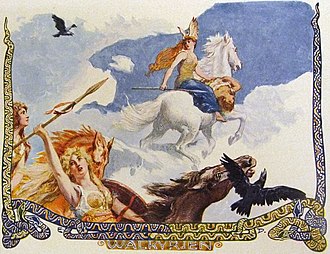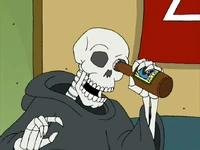In this post, I want to discuss death (and beyond?).
The good news is that for many of us in the modern world, death is not something we see everyday. That is a wonderful world to live in. However, the less you encounter something, the more unfamiliar it becomes. We become afraid of things we don't know about or trust.
Let me be clear. I am not talking about our innate fear of dying that helps us survive. To sense a threat and go to a fight or flight state is a very helpful feature of our programming.
Instead, I am referring to fearing death as if it is the main monster in a slasher horror film. It is something we recoil from, running away screaming when its shadow looms around us.
In our current times, we are battling a new monster like COVID-19, and death seems to be wreaking havoc among us in a Godzilla-esque fashion.
What I would like to entertain is a more neutral perspective. Can we come to a state of acceptance and perhaps even comfort with death? If so, then perhaps we can respond to it calmly and naturally.
A Point of Transition to a New State of Being
The many religions of the world, both modern and ancient, have some belief in an afterlife. While there is often a dark side, I want to focus on the happier possibilities.
Let's entertain the thought that some new state of existence awaits us beyond this life, and transcends our corporeal existence.
There is an expression from Peter Pan, and later echoed by Dumbledore in Harry Potter, that death would be an awfully big adventure.
It's Bilbo Baggins sailing off to the undying lands.
It's Yoda and others from the Star Wars series becoming helpful ghosts.
Through all of it, the idea is that death is not the end - period.
Even if you believe that we just become worm food when it is all said and done, there is still some sort of energy transformation. You become part of the natural cycle, and maybe it could be as beautiful as the leaves in autumn.
The song "Come Home" by Cloud Cult it particularly beautiful.
I gave my bones back to the trees/so when you hear the breeze, you/ you know I’ll never leave you
I gave my skin back to to the prairie./So in the coldest thunder showers./You will see me in the flowers.
I gave my heart back to the galaxies/So when you look above you./You know I’ll always love you
With this view of death, mortality can almost be something to look forward to. Or at least it can give us peace that those who have passed are in "a better place."
Leaving a Legacy
If this life is all we get, then it is up to us to figure out what mark we will leave on the world.
According to the traditions of Dia De Los Muertos, our ancestors live on as long as we remember them.
Perhaps this puts more specificity on our fears of death. They are the fears of being forgotten. Or the fears of being insignificant.
So how do we leave our mark on this world? We can immortalize ourselves through story - writing tales that get published, doing something legendary, getting in the news. We can set up endowments or donate money to a school or church. We procreate, and keep our genetic profiles going for at least one more generation.
In this "powerful play" as the poet Whitman put it, "you may contribute a verse."
A Glamorous Death
Alone, in space, Tony Stark, a.k.a Iron man contemplates imminent mortality. "Part of the Journey is The End."
The Vikings are notorious for embracing death with open arms. Their ticket to paradise was to go out in a bang, preferably in battle, to be carried to Valhalla by the Valkyries. Similar attitudes are adopted by some jihadist factions and the kamikaze and samauri traditions of Japan
An literal take on going out with a bang comes from the journalist Hunter S. Thompson, who wrote at one point:
"Life should not be a journey to the grave with the intention of arriving safely in a pretty and well preserved body, but rather to skid in broadside in a cloud of smoke, thoroughly used up, totally worn out, and loudly proclaiming "Wow! What a Ride!"
Thompson later would commit suicide, by gunshot, plagued by depression and health problems. His ashes were shot out of a cannon at his funeral, accompanied by red, white and blue fireworks. (source)
Is there a healthy way to imagine your own death without seeming suicidal or zealous? In at least some cases, being conscious of your own mortality can make positive changes in your attitude. Generally there is a trend toward compassion, forgiveness, and serenity as people age.
There is a really good article that considers the good and not so good outcomes that could come with making mortality forefront in the mind. It comes from the Atlantic by Julie Beck. What Good is Thinking About Death?
If you could choose how you go out, what would that look like? I've imagined being over a hundred years old, getting a super expensive car, and launching it off a cliff, Thelma and Louise Style. Or more subtly, I imagine being at home, surrounded by the ones I love, and starting to tell a joke, but taking my last breath before I get to the punchline.
Game Over
If you ever spend time in a video game arcade, you will inevitably hear the groans of frustration as some player exhaust their last quarter and fails to beat the final boss. Game Over.
Getting a "Game Over" can be a function of a lack of skill. But it can also be simply chance, or bad luck. Fate is a common associate of Death, appearing together in many stories and myths. Yet, the role of fate in our day to day lives doesn't really scare us. We can accept that not every at bat will result in a hit, that it was out of our control that the store ran out of that thing we wanted, that my car got a flat tire.
This probabilistic view of death is my default position. Probably because of my actuarial training, I'm constantly viewing the course of my life as a progression through actuarial tables. I find the randomness of death to take away a lot of the sting of its potency.
That said, I certainly breathe a sigh of relief each morning when I wake up.
Defying and Discrediting Death
One way to conquer fears is to make fun of them. In fact, humor may even be a hardwired defense mechanism for some of us. (source) In a variety of psychological studies the role of humor can be preventative, at a minimum, and potentially, therapeutic.
Consider Death attempts Stand Up Comedy.
The lighter side of death has made appearances in shows like the Simpson's, Family Guy, South Park.
And you can't omit the classic scene from Monty Python's Meaning of Life, when Death is invited as a Dinner Guest.
In conclusion, my hope is that death has lost a little harshness as a result of this tour of perspective.
How do you view death - as something magical and mysterious, something random, something epic, or just a really bad joke?



